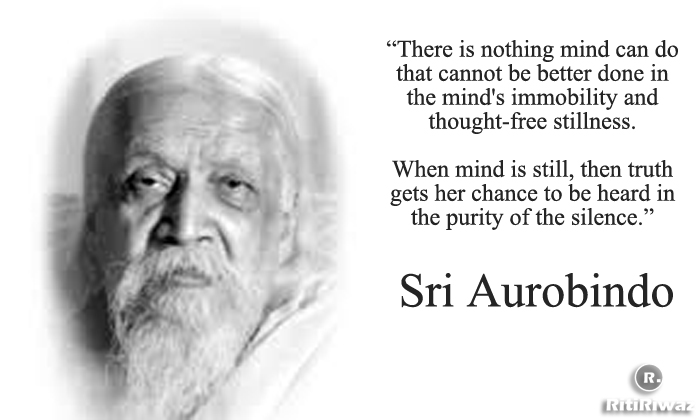Transforming the Vital Nature - Sri Aurobindo.
========================================================================
========================================================================
Saturday, July 23, 2022. 06:00.
Part 2: Overcoming Difficulties and Obstacles on the Path :
========================================================================
========================================================================The primary initial difficulties faced by the sadhak in overcoming the vital nature are related to the Gunas of Rajas and Tamas. Rajas is naturally energetic and somewhat aggressive and thus, it tackles issues with vehemence. When it becomes frustrated or suffers a setback, it tends to recoil into tamas, with its depression and feelings of failure or weakness. While there are also at some point obstacles caused by excess of Sattwa, at least initially, it is the quality of sattwa that can aid the sadhak in overcoming the difficulties associated with the other two gunas, by developing peace and calm, patience and long-standing perseverance.
The Mother writes: “Depression, unless one has a strong will, suggests, ‘This is not worth while, one may have to wait a lifetime.’ Enthusiasm, it expects to see the vital transformed overnight: ‘I am not going to have any difficulty henceforth, I am going to advance rapidly on the path of yoga. I am going to gain the divine consciousness without any difficulty.’ There are some other difficulties …. One needs a little time, much perseverance. So the vital, after a few hours — perhaps a few days, perhaps a few months — says to itself: ‘We haven’t gone very far with our enthusiasm, has anything been really done? Doesn’t this movement leave us just where we were? — perhaps worse than we were, a little troubled, a little disturbed? Things are no longer what they were, they are not yet what they ought to be. It is very tiresome, what I am doing’ And then, if one pushes a little more, here’s this gentleman saying, ‘Ah! no, I have had enough of it, leave me alone. I don’t want to move, I shall stay in my corner, I won’t trouble you, but don’t bother me!’ and so one has not gone very much farther than before.”
“This is one of the big obstacles which must be carefully avoided. As soon as there is the least sign of discontentment, of annoyance, the vital must be spoken to in this way, ‘My friend, you are going to keep calm, you are going to do what you are asked to do, otherwise you will have to deal with me.’ And to the other, the enthusiast who says, ‘Everything must be done now, immediately’, your reply is, ‘Calm yourself a little, your energy is excellent, but it must not be spent in five minutes. We shall need it for a long time, keep it carefully and, as it is wanted, I shall call upon your goodwill. You will show that you are full of goodwill, you will obey, you won’t grumble, you will not protest, you will not revolt, you will say ‘yes, yes.’ You will make a little sacrifice when asked, you will say ‘yes’ whole-heartedly.’ “
“So we get started on the path. But the road is very long. Many things happen on the way. Suddenly one thinks one has overcome an obstacle; I say ‘thinks’, because though one has overcome it, it is not totally overcome. I am going to take a very obvious instance, of a very simple observation. Someone has found that his vital is uncontrollable and uncontrolled, that it gets furious for nothing and about nothing. He starts working to teach it not to get carried away, not to flare up, to remain calm and bear the shocks of life without reacting violently. If one does this cheerfully, it goes quite quickly (note this well, it is very important: when you have to deal with your vital, take care to keep your good humour, otherwise you will get into trouble). One keeps one’s good humour, that is, when one sees the fury rise, one begins to laugh. Instead of being depressed and saying, ‘Ah! in spite of all my effort it is beginning all over again’, one begins to laugh and says, ‘Well, well! one hasn’t yet seen the end of it. Look now, aren’t you ridiculous, you know quite well that you are being ridiculous! Is it worthwhile getting angry?’ One gives it this lesson good-humouredly. And really, after a while it doesn’t get angry again, it is quiet — and one relaxes one’s attention. One thinks the difficulty has been overcome, one thinks a result has at last been reached: ‘My vital does not trouble me any longer, it does not get angry now, everything is going fine.’ And the next day, one loses one’s temper. It is then one must be careful, it is then one must not say, ‘Here we are, it’s no use. I shall never achieve anything, all my efforts are futile; all this is an illusion, it is impossible.’ On the contrary, one must say, ‘I wasn’t vigilant enough.’ One must wait long, very long, before one can say, ‘Ah! it is done and finished.’ Sometimes one must wait for years, many years….”
*****
=========================================================================






Comments
Post a Comment